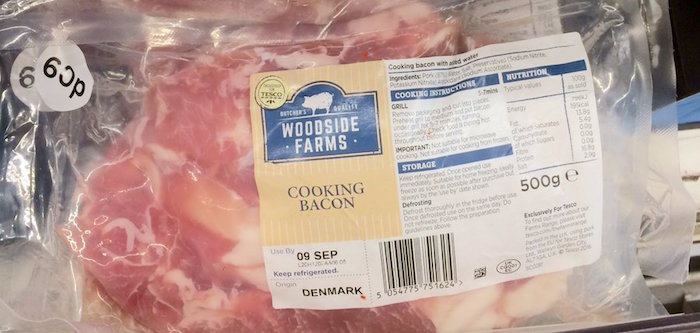Tesco has ‘apologised for any confusion’ caused while also defending its use of ‘fake farm’ labels, after one of its major competitors announced it would no longer display them.
Earlier this month, Morrisons revealed it would not adopt brands using fictitious farm names after a survey it commissioned showed 70% of consumers objected to them and only wanted genuine place or farm names on packaging and branding.
Farming organisations including the NFU, the National Pig Association and the Soil Association have consistently condemned use of the brands by the likes of Tesco and Asda because of fears they mislead consumers. This is because the brands, such as Tesco’s Woodside Farms, include imported and domestically-produced meat.
Tesco was challenged over its policy by Twitter user Will de Feyter (@WilldeFeyter), a Harper Adams graduate and now an arable, pig and sheep farmer.
Above a picture of British and Danish Woodside Farms pork, he wrote: “@Tesco Woodside farms have farms in Denmark & UK? Different country of origin in the same packaging & shelf space – a bit misleading.”
Tesco, which the bi-monthly Porkwatch survey shows is second only to Asda when it comes to stocking imported pork, responded with a series of tweets defending its policy.
@Tesco Woodside farms have farms in Denmark & UK?Different country of origin in the same packaging & shelf space- bit misleading? @NFUtweets pic.twitter.com/L4xI2GFrGW
— Will de Feyter (@WilldeFeyter) August 13, 2017
It said: “We’re committed to supporting the British pig industry & all of our Finest bacon, gammon + sausages are sourced using only British pork.
“This includes our standard range of bacon and gammon, where we ensure that the pigs’ welfare is of the highest standard.
“Some of our products are sourced from Holland and Denmark due to the high demand of raw material required. However, we know how it important it is for you to make an informed decision about what food you buy.
“So we’ll always display the country of origin for our pork products. I hope this helps to explain our position Will.”
After Mr de Feyter responded reiterating his concerns ‘that the packaging is nearly identical & they were all mixed up in the same space on the shelf – not exactly clear’, Tesco issued an apology of sorts.
“I’m sorry for any confusion, Will, your feedback really is beneficial for us to receive,” the retailer replied on its Twitter feed.
Momentum growing
Tesco is not the only offender. After it launched seven fictitious farm brands in 2016, Asda relaunched its value Smart Price food range as Farm Stores this April. Aldi reportedly replaced its Wood Farm brand with Nature’s Pick earlier this year, while its Ashfield Farm brand sells 100% British meat.
Momentum against supermarkets still using fictitious brands is growing, following the move by Morrisons, which dropped a brand called Hemsley’s – based on the real North Yorkshire town of Helmsley – more than a year ago.
NFU Deputy President Minette Batters welcome the commitment, adding: “In our view it is important that product names and descriptions on packaging are clear, accurate and do not mislead consumers.”
FARMA, the trade association for Farm Shops and Farmers’ Markets in the UK, also welcomed the decision. Its chairman Milly Stokes said the labels ‘only serve to confuse shoppers, who our own research says are increasingly concerned about the provenance of their food’.
“Whilst the decision by Morrisons is good news, some of the UK’s biggest supermarket brands are still using ‘fake farms’ to market their produce. We hope that increased pressure from consumers will help stamp out this confusing practice.”
Soil Association policy director Peter Melchett said: “The news that Morrisons has chosen not to use fake farm brand names is a welcome acknowledgment that this is bad practice and insulting to both farmers and shoppers – other supermarkets who still use fake farms on their packaging should do the same.”
Yorkshire pig farmer and former NPA chairman Richard Longthorp last year accused Tesco appeared of forgetting the lessons about trust it should have learned from the horsemeat scandal.
“They are using tertiary brands (aka flags of convenience) such as ‘Woodside Farms’, to trick their customers into thinking that the meat they are buying is British. Well there can’t be that many pig farms in Denmark or Holland called “Woodside” can there? Strange way to try and gain customer’s trust!”




